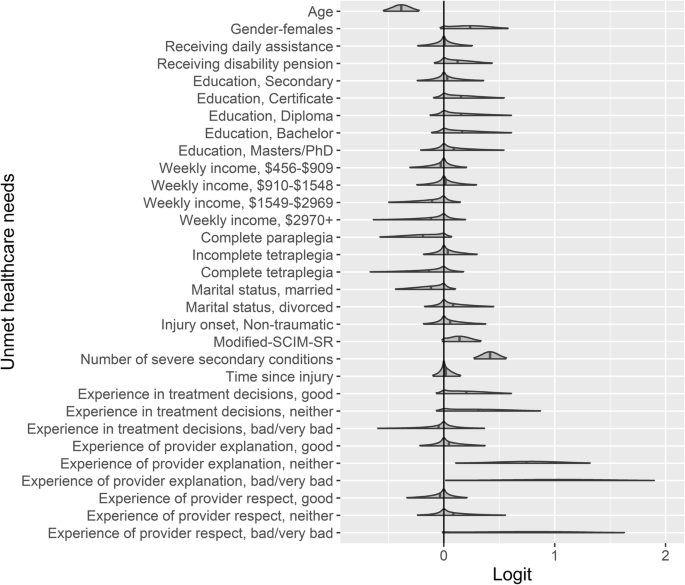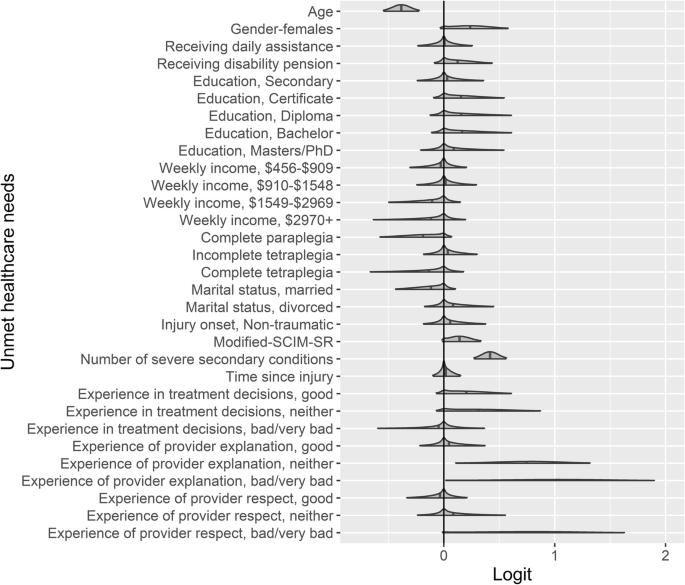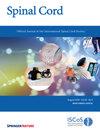澳大利亚脊髓损伤患者未得到满足的医疗保健需求、获得服务的机会以及与医疗服务提供者的接触经历。
IF 2.1
4区 医学
Q3 CLINICAL NEUROLOGY
引用次数: 0
摘要
研究设计横断面调查:脊髓损伤(SCI)后适当、及时地终身获得医疗保健服务至关重要,但在这一人群中,医疗保健需求未得到满足的情况却很普遍。我们假设未满足的医疗保健需求与护理经验之间存在关联。本研究旨在(1) 描述医疗服务提供者在过去一年中的使用情况、未满足的医疗需求以及对医疗服务的满意度;(2) 探讨与医疗服务提供者打交道的经历与未满足的医疗需求之间的关联;以及 (3) 探讨医疗服务提供者的使用情况与参与者特征(包括未满足的医疗需求)之间的关联:方法:对 1579 名澳大利亚人的数据进行分析:分析 1579 名年龄≥ 18 岁、SCI 后≥ 1 年且居住在社区的澳大利亚人的数据。采用贝叶斯惩罚回归法建立了六个二元结果模型:未满足的医疗保健需求;全科医生(GP)、专职医疗人员、康复专家的使用情况;医疗专家;以及过去 12 个月的住院情况:17%的参与者报告了未满足的需求,而服务成本是阻碍他们接受服务的常见因素。有证据表明,医疗服务提供者的经验对未满足的医疗需求有影响,但没有证据表明未满足的医疗需求与全科医生、专职医疗人员、康复或医疗专家的使用有关:结论:在长期患有 SCI 的人群中,有报告称未满足的医疗保健需求与医疗保健使用率高和继发性疾病比例高有关。需要改善 SCI 患者的医疗服务,包括加强初级和中级医疗服务之间的合作。本文章由计算机程序翻译,如有差异,请以英文原文为准。


Unmet healthcare needs, access to services and experiences with health providers among persons with spinal cord injury in Australia
Cross-sectional survey. Appropriate and timely lifelong access to healthcare following a spinal cord injury (SCI) is critical, yet unmet healthcare needs in this population are common. Poor experiences with healthcare providers can be a barrier to health-seeking behaviour, and we hypothesised that there would be an association between unmet healthcare needs and care experiences. This study aimed to: (1) describe healthcare provider utilisation in the past year, unmet care needs and satisfaction with healthcare services; (2) explore the association between experiences with healthcare providers and unmet healthcare needs; and (3) explore the association between healthcare provider utilisation and participant characteristics, including unmet healthcare needs. Community. Analysis of data for 1579 Australians aged ≥ 18, who were ≥ 1-year post-SCI and living in the community. Bayesian penalised regression was used to model six binary outcomes: unmet healthcare needs; the use of general practitioners (GPs), allied health practitioners, rehabilitation specialists; medical specialists; and hospitalisations in the past 12-months. Unmet needs were reported by 17% of participants, with service cost the common deterrent. There was evidence of an effect for provider experiences on unmet healthcare needs, but no evidence that unmet healthcare needs was associated with the use of GPs, allied health practitioners, and rehabilitation or medical specialists. Unmet healthcare needs were reported in the context of high healthcare use and large proportions of secondary conditions in a cohort with long-term SCI. Improved health access for people with SCI include better primary-secondary care collaboration is needed.
求助全文
通过发布文献求助,成功后即可免费获取论文全文。
去求助
来源期刊

Spinal cord
医学-临床神经学
CiteScore
4.50
自引率
9.10%
发文量
142
审稿时长
2 months
期刊介绍:
Spinal Cord is a specialised, international journal that has been publishing spinal cord related manuscripts since 1963. It appears monthly, online and in print, and accepts contributions on spinal cord anatomy, physiology, management of injury and disease, and the quality of life and life circumstances of people with a spinal cord injury. Spinal Cord is multi-disciplinary and publishes contributions across the entire spectrum of research ranging from basic science to applied clinical research. It focuses on high quality original research, systematic reviews and narrative reviews.
Spinal Cord''s sister journal Spinal Cord Series and Cases: Clinical Management in Spinal Cord Disorders publishes high quality case reports, small case series, pilot and retrospective studies perspectives, Pulse survey articles, Point-couterpoint articles, correspondences and book reviews. It specialises in material that addresses all aspects of life for persons with spinal cord injuries or disorders. For more information, please see the aims and scope of Spinal Cord Series and Cases.
 求助内容:
求助内容: 应助结果提醒方式:
应助结果提醒方式:


